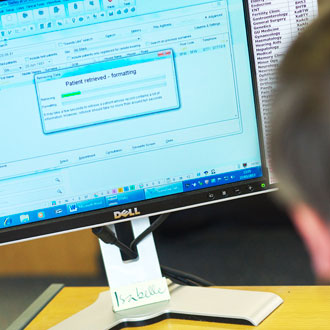GPs told to ‘hold urgent referrals’ after IT issue prevents electronic referrals

Exclusive GP leaders in Kent have warned local hospital trusts that they will not support the switch-off of paper referrals for fear that it will compromise patient care.
This comes after an IT failure at a local hospital trust meant GPs were asked to ‘hold urgent referrals’ for 24 hours earlier this month.
Maidstone and Tunbridge Wells Hospital NHS Trust said the IT issue was resolved within four hours and did not adversely affect patient care.
But Kent LMC argued that this shows a ‘lack of preparedness’ and that GPs should continue to use paper referrals until all concerns have been addressed.
GPs in Kent were alerted to an issue with the trust’s patient administration system (PAS) on 10 May, which meant they could not book appointments, and so should hold urgent referrals.
The alert from the trust, seen by Pulse, said: ‘Unfortunately there has been an IT issue this morning at MTW meaning their PAS system has gone down, so although you may still be able to access eRS you may not be able to book any appointments.’
GPs were then told that they should ‘hold urgent referrals for 24 hours and routine referrals for 48 hours’ before emailing them to the clinical assessment unit teams.
But the email added that ‘in no circumstance should you hold 2WW referrals; these should be emailed immediately to the CAU teams’.
This comes after Kent LMC sent a letter to the local hospital trusts last month stating that it was ‘concerned that patient care will be compromised’ by e-referrals.
The letter included a motion that was passed by the LMC with five conditions to be met before they would support eRS, including the implementation of a backup system in case of an IT failure.
Kent LMC chair Dr Gaurav Gupta, who also sits on the BMA’s GP committee, told Pulse: ‘This shows a lack of preparedness and why the system is not yet fit for purpose.’
He said: ‘Kent LMC wants to ensure that the eRS roll out does not compromise patient safety. It is not acceptable that patient referrals should be delayed due to problems with eRS.
‘We are working with NHS England to ensure that the system is safe for patients and does not add unnecessary burden on practices already under pressure.’
But Maidstone and Tunbridge Wells NHS Trust spokesperson told Pulse: ‘The trust has robust business continuity measures in place.
‘These were recently used when a power test resulted in our PAS being unavailable for four hours and maintained real-time referrals for urgent cancer appointments.’
The trust said that while the system was down for four hours, it did not adversely affect patient experience.
Neighbouring trust Medway NHS Foundation Trust said it is in talks with local GPs to ‘address the issues that they have raised’ before implementing a ‘hard switch-off’.
Liz Capp-Gray, acting director of IT, said: ‘Since our “soft switch-off” of hard copy referrals a few weeks ago, where we continued to accept both electronic and non-electronic referrals, we have seen the majority of referrals from GPs come through the e-referral system.’
Problems with the e-Referral service
Earlier this year GP practices were told that paper referrals would be switched off from October, in accordance with the new GP contract.
This comes after health secretary Jeremy Hunt vowed in 2013 to make the NHS paperless ‘at the point of patient care’ by 2018.
Sherwood Forest Hospitals NHS Foundation Trust and Country Durham and Darlington NHS Foundation Trust were the first trusts to ditch paper referrals in 2017.
The e-Referral system launched in summer 2015 – although some early ‘technical difficulties’ force GPs back to fax machines shortly after.
CCGs were then incentivised, with up to £55m in funding, to move away from paper referrals under last year’s quality premium, and enabling patients to go online and book a time and hospital of their choosing is a key part of the Government’s ‘patient choice’ agenda.
e-Referrals replaced the old Choose and Book, which was also meant to be used for all referrals but in practice was never used for more than half of appointments.
Pulse October survey
Take our July 2025 survey to potentially win £1.000 worth of tokens











